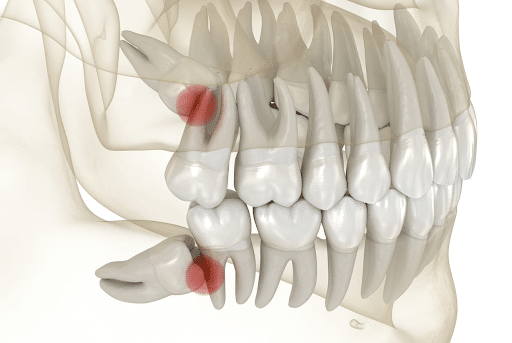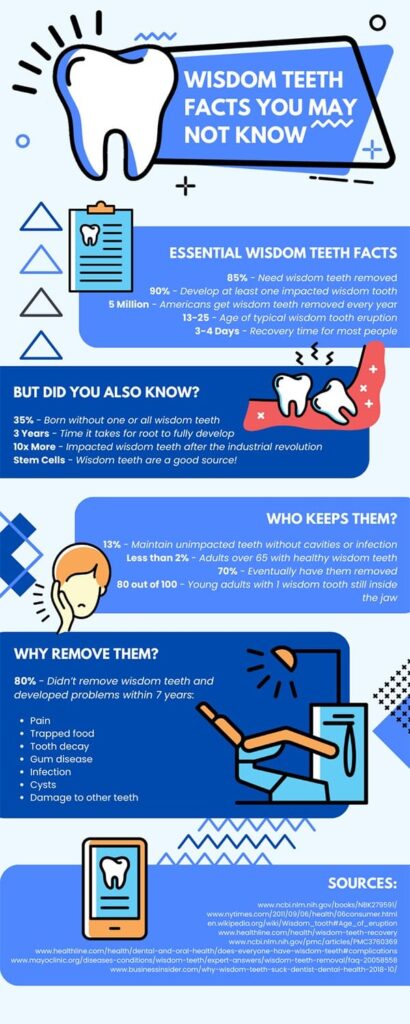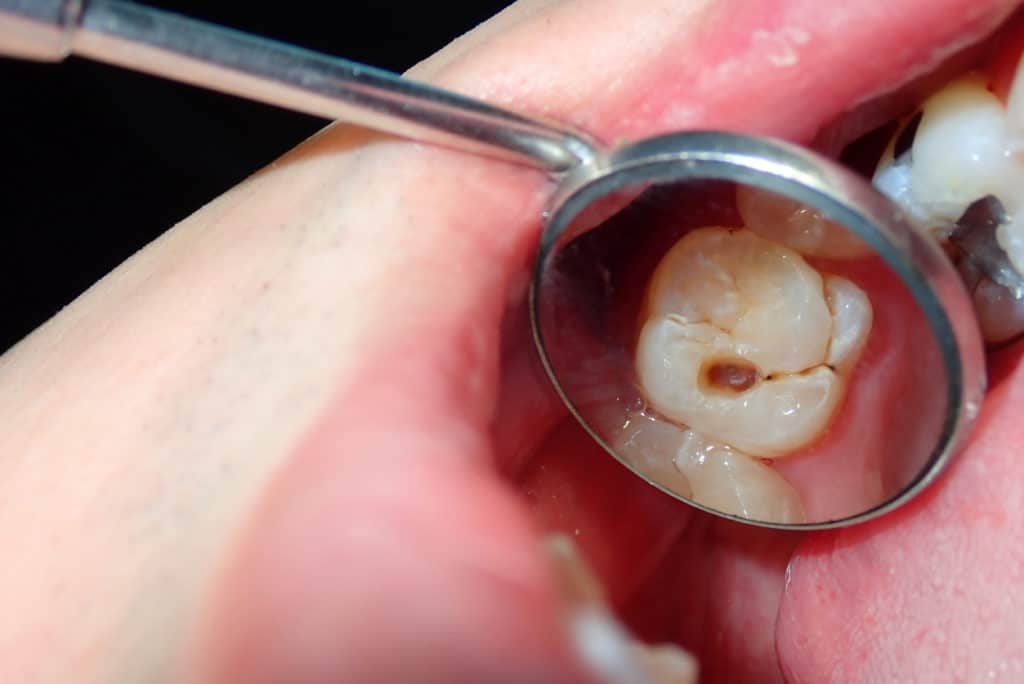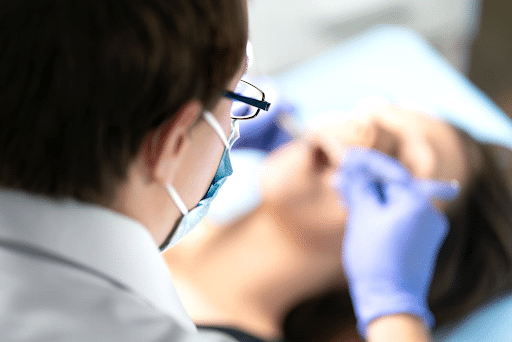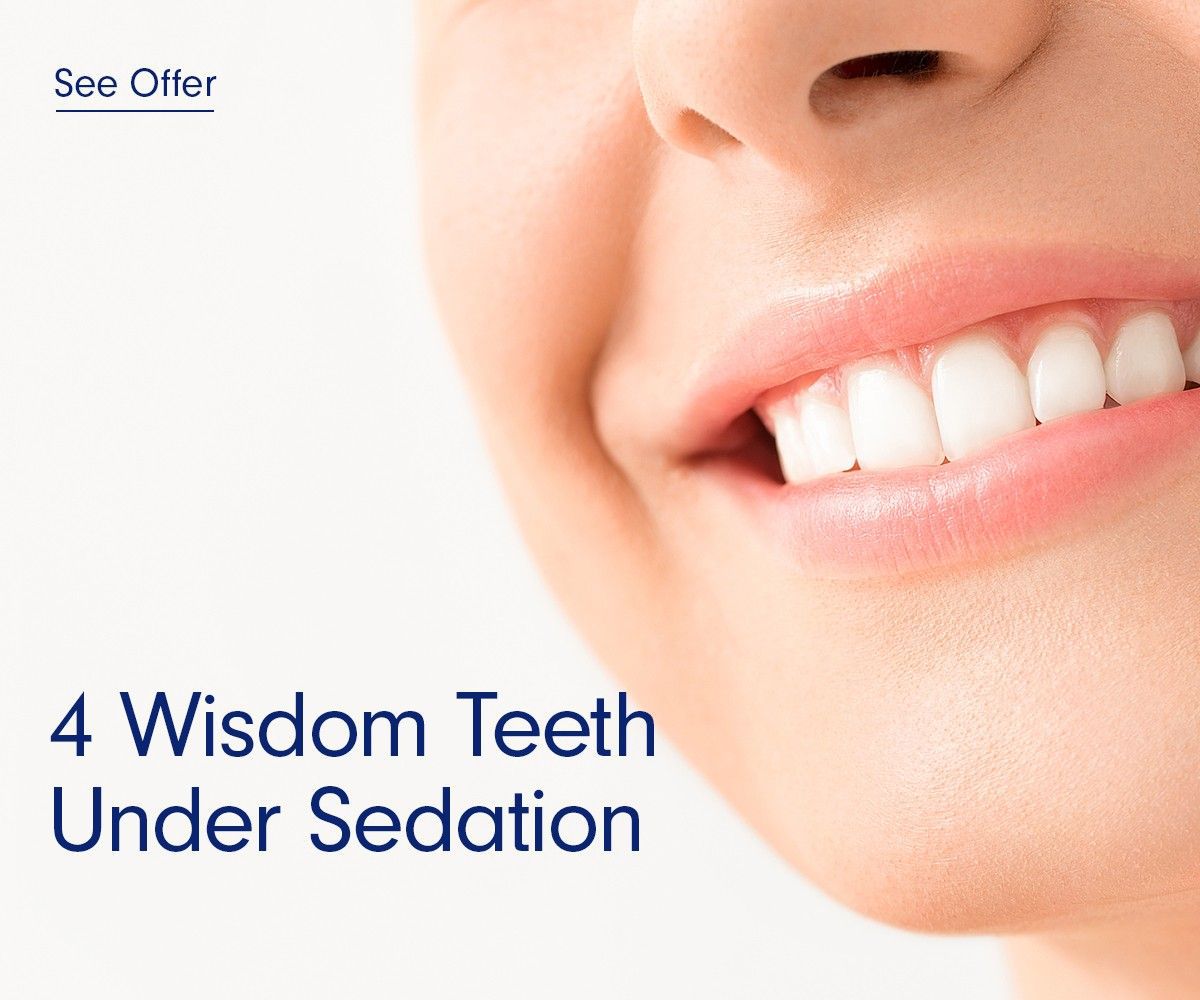Some people find themselves dealing with wisdom teeth issues during adolescence and early adulthood. According to the American Dental Association (ADA), this third set of molars tends to erupt between the ages of 17 and 21 and can create problems if they don’t grow in properly. Unfortunately, these wisdom teeth symptoms can often include pain and discomfort.
Absolute Dental shares the common signs that you may need to remove your wisdom teeth before they cause more extensive damage.
Do I Have To Have My Wisdom Teeth Removed?
The importance of healthy teeth is stressed from a young age. Since caring for and retaining teeth is so important, it may be confusing to consider removing adult teeth, and some people live with their wisdom teeth without any issues. You may not have to remove them, but when it comes to wisdom teeth removal, what is okay for one person may not be an option for another. Determining whether you need to have your wisdom teeth pulled begins with understanding their place in tooth eruption.
When Do Wisdom Teeth Come In?
Although coping with an infant’s teething can be challenging, healthy teeth are essential. You use your teeth to communicate because your lips, tongue, and teeth form sounds. That’s why some children have a lisp when they start losing their baby teeth.
Baby teeth start falling out around the age of six, and the first permanent teeth come in between the ages of six and seven. The arrival of permanent teeth is staggered; canine teeth, premolars, and second molars may not arrive until age 13.
Wisdom teeth, or third molars, are the last to arrive. These teeth can come in during your late teen years but may not arrive until you’re 21. Some people never get wisdom teeth. Since people stop growing between the ages of 15 and 18, wisdom teeth often arrive after a person’s fully grown.
How Wisdom Teeth Affect The Mouth
The human body has changed over time, so bodies have components, such as the appendix, that no longer serve a critical purpose. People can live without the need for ongoing medical care if they have their appendix removed.
Wisdom teeth once played a crucial role in food consumption. However, agricultural practices changed how people ate, prompting changes to the human jaw. Now, wisdom teeth may push against other teeth and cause dental issues.
Should You Remove Your Wisdom Teeth?
You should consult your dentist to determine if your wisdom teeth need to be removed. Your dentist can take X-rays to determine whether you have impacted wisdom teeth. These are wisdom teeth without enough room to erupt safely. The National Institutes of Health (NIH) has shared that as many as four out of every five European young adults have an impacted wisdom tooth.
Sometimes, impacted wisdom teeth never cause issues. However, impacted wisdom teeth can cause critical issues that may require extensive dental treatment and removal of your wisdom teeth. Since it’s impossible to know if your impacted wisdom teeth could cause an infection or cyst until these problems arise, your dentist may recommend extraction to prevent the possibility of complications in the future.
Wisdom teeth may also partially erupt. Keeping these teeth clean can be challenging when they don’t fully emerge, leading to infection, gingivitis, and periodontal disease.
Contact Absolute Dental and book an appointment today! Our dentists can evaluate your teeth, determine if there’s enough space for wisdom teeth to erupt safely, and explain the pros and cons of removing your wisdom teeth.
Wisdom teeth also affect the alignment of your teeth. Teenagers and young adults can have their wisdom teeth pulled before getting braces because if your mouth doesn’t have enough space for your wisdom teeth, they may push against your teeth and cause new alignment issues.
Why Do We Have Wisdom Teeth?
Suppose you’ve ever had a sensitive tooth. In that case, you know that applying pressure to sensitive areas in your mouth will increase the pain. You may experience other symptoms, such as bleeding gums. You may have avoided hard foods or avoided your sensitive teeth when chewing foods. Strong teeth can handle hard foods; our ancestors needed strong teeth to break down hard foods, such as raw vegetables.
Although dietary changes led to changes in the size and shape of the human jaw, most people still get their wisdom teeth. However, wisdom teeth no longer perform the crucial task they once performed for our ancestors.
Share this Image On Your Site
At What Age Should I Get My Wisdom Teeth Removed?
An initial evaluation of the wisdom teeth by a professional at your dental clinic is recommended between the ages of 16 and 19. This is the optimal wisdom teeth removal age because the wisdom teeth are usually in the process of developing and are still soft and pliable. Because the teeth become hard as they grow, it’s often best to remove them before they fully erupt.
Some dentists decide to remove wisdom teeth to prevent problems later on, even if the patient is not experiencing any of the common symptoms. However, your dentist may also choose to leave them alone if there is enough room to accommodate these molars and they don’t appear to be causing issues.
Wisdom Teeth Hurting? Make an Appointment by Calling (844) 8‑SMILE‑NOW!
What Are Common Causes for Wisdom Teeth Removal?
Your dentist may recommend wisdom teeth extraction to prevent or eliminate common symptoms and dental issues, including:
1.Impacted Wisdom Teeth
In some cases, wisdom teeth become impacted and do not have enough space to emerge from the gums and develop normally.
Impacted wisdom teeth can cause symptoms, including:
- Swollen, tender, or bleeding gums
- Jaw pain
- Swelling or stiffness in the jaw
- Bad breath
- Difficulty opening the mouth
Dentists and oral surgery physicians may recommend removing impacted wisdom teeth to prevent future issues or other oral health problems.
2.Incorrect Growth
When wisdom teeth grow in crooked, they take up too much space in the mouth and cannot be straightened out with braces. When the mouth is overcrowded, no procedure can be done to make the teeth fit, and the only option is to have them removed.
A dentist can determine which teeth to remove. They might have to extract all of them or possibly only a few.
Before wisdom teeth grow in, there are normally 28 teeth in the mouth. After the wisdom teeth grow in, there are 32 teeth. With the additional teeth, the mouth might not have enough room, leading to pain and discomfort.
3.Pain and Irritation
As wisdom teeth grow in, they can cause aches and pains. If you are experiencing pain or discomfort, contact your dentist for an exam and an X-ray. Your dental office can determine whether the wisdom teeth or other factors are causing pain and may decide that extraction is not the best solution. Over time, pain may correct itself and will require no extraction.
4.Difficulty Eating
If you experience pain while eating, this might be a reason to have your wisdom teeth taken out. Food could get stuck between the gums and the tops of the teeth. This could cause many problems if you cannot get to the back of the mouth and clean well enough while brushing.
Checking with a dentist to find the right products to fix this problem is the best way to handle it. An extraction might be the only choice if it can’t be resolved.
Don’t Let the Pain Continue! Call (844) 8‑SMILE‑NOW or make an appointment online today.
5.A Cyst Forms Around the Tooth
When a sac next to the teeth becomes filled with fluid, this is called a cyst. If left untreated, it can destroy bones, tissue, nerves, and surrounding structures. If it becomes too severe, the cyst can become a tumor and require additional surgery.
6.Teeth Are Not Straight
If the wisdom teeth grow in crooked, they can make the other teeth shift and move over. They might even damage the other teeth. Extraction can prevent other teeth from having any damage.
In many instances, our jaws are not large enough to accommodate a 3rd molar, which then bumps against the others, causing it to grow sideways. You should also consider removing wisdom teeth before orthodontic treatment to allow more room for misalignments to shift.
7.Sinus Issues
Wisdom teeth can cause a variety of sinus problems. These problems arise if the teeth grow in on the upper jaw. When the teeth erupt, and roots develop, they can push and rub against the sinuses, adding additional pressure. Even though this problem doesn’t happen frequently, wisdom teeth can sometimes lead to sinus pain, pressure, headaches, and congestion.
8.Cavities
The position of the wisdom teeth can significantly impact cleaning surfaces where bacteria can hide and affect dental health. If the gums become irritated, pockets can develop between the teeth and cause bacteria to grow. This will then promote the development of cavities and tooth decay, eventually leading to infection.
9.Inflamed Gums
Sometimes, when wisdom teeth start to break through the gums, it can create a flap of gum tissue that resides next to the tooth. This gum tissue can trap small particles of food and bacteria. As a result, tissue around the teeth can become stiff and inflamed, making it hard to clean. This condition is called pericoronitis and can also occur around wisdom teeth while still below the gum line.
Don’t wait for the pain to get worse! Make an appointment and get relief for wisdom tooth pain now.
What Is Involved in the Extraction Procedure?
A dentist or oral surgeon performs the wisdom tooth extraction procedure, which involves these steps:
- Before the procedure: Patients usually have a general or local anesthetic. A general anesthetic will require someone to help you after the surgery. However, there are many sedation options for wisdom teeth extractions.
- During the procedure: Depending on how many teeth will be removed and the severity of the case, the procedure can take up to several hours. Dental assistants will help the dentist with the extraction. It’s essential to keep an eye on the surgery site after removal to limit your chances of developing a dry socket (when a blood clot fails to set before the wound has healed) or an infection.
- After the procedure: Your dentist may instruct you to avoid blood thinners, such as aspirin, after the surgery. There will also be aftercare that could involve antibiotics or prescription medication for the pain.
Your sedation options affect the cost of the procedure. They’ll also affect your prognosis after the procedure. When choosing your preferred sedation option, consider the following:
- Awareness: Local anesthesia lets you stay awake during the procedure, but general anesthesia puts you to sleep.
- Cost: You may spend a few hundred dollars for local anesthesia. However, general anesthesia will cost thousands if you need to go to a hospital for surgery.
- Health concerns: You may have other health issues that could determine the best sedation option. You must discuss your health concerns with your dentist to ensure you receive appropriate care.
- Location: You may have to travel to a different location for general anesthesia. You must discuss your options with your dentist and understand what options are available in your dentist’s office and which options may require travel.
- Recovery time: You can be awake and reasonably alert within a few hours if you have local anesthesia but should expect symptoms from sedation to last a full day. The effects of general anesthesia typically last for a day or two.
Do Wisdom Teeth Need to Be Removed?
Some people live with their wisdom teeth for their entire lives. In some cases, removing any teeth may not be recommended because there is a chance of the teeth shifting. If they are not causing you any problems and your dental care is sufficient, you should not worry about having them removed.
If they do need to be removed, you might have the option of getting two removed at a time (all of the top teeth or all of the bottom teeth), or you can get all of them extracted at the same time to keep you from having to make a second appointment.
Risks Of Delaying Wisdom Teeth Extraction
You may not suffer side effects if you wait for your wisdom teeth. However, those that do experience issues may find delaying extraction impacts their social life, health, and finances.
Social life
Cysts, gingivitis, and periodontal disease cause multiple symptoms, including bad breath. Persistent issues with your breath could impact your social life. Impacted wisdom teeth can also cause pain, making it difficult to move your mouth and speak. This could affect your ability to communicate with friends and family until your teeth are removed.
Health
Since wisdom teeth issues can make opening or moving your mouth hard, you may limit your diet to soft foods or liquids. Consuming soft foods or liquids can affect your ability to get essential nutrients. Your teeth also weaken if you don’t use them to chew foods, increasing the risk of cavities and infection.
Infections can cause gum disease, and when gum disease progresses, the impact can spread throughout your body. Bacterial infections can spread if left untreated. Studies have established a correlation between gum disease and the following health problems:
- Blood clots
- Damaged arteries
- Damaged veins
- Heart attack
- Heart disease
- Inflamed blood vessels
- Stroke
Finances
You may be able to have all four wisdom teeth removed for $800, or you may spend over $4,000. Costs fluctuate because the cost depends on the anesthesia used and the state of each wisdom tooth at the time of removal.
You may hold off on wisdom teeth extraction and hope you won’t need to pay for this procedure. However, if issues arise, you’ll probably have to pay for extraction and cover additional costs, such as the following:
- Bone grafts: Bones hold your teeth in place. Periodontal disease can weaken these bones, leading to bone loss. You may need a bone graft to replace the missing bone. This procedure can cost $1,000 or more.
- Deep cleaning: A deep cleaning can help resolve gingivitis. Deep cleanings typically cost up to $300.
- Surgery: Dental surgery costs vary, costing as little as $1,000. However, if there are multiple issues to correct, surgery costs could reach $3,000.
- Tissue grafts: Like bone grafts, tissue grafts can cost up to $1,000 or more
Issues with wisdom teeth can also impact your income if you can’t move your jaw and communicate effectively. You may also incur other secondary expenses, such as treatment costs for heart disease.
Wisdom Tooth Removal Near Me
If you’re wondering if it’s time to get your wisdom teeth removed, make an appointment with your dentist to take a closer look at your dental healthcare needs. It’s ideal to schedule an appointment before problems begin for recovery to go as smoothly as possible.
The dental experts at Absolute Dental are here to help. Make an appointment today!
Sources:
American Dental Association (ADA). Wisdom Teeth. Mouth Healthy. Retrieved 13 April 2022.
Anesthesia Costs. (2023).
Carter, M. (2023). When do boys stop growing?
Clark, L. (2015). Before Agriculture, Human Jaws Were a Perfect Fit for Human Teeth.
How is Periodontal Disease Treated? (2019).
Mayo Clinic. (14 February 2020). Periodontitis. Retrieved 13 April 2022.
Roberte, L. (2022). How Much Does Wisdom Teeth Removal Cost?
Salinas, T.J. (2016). Wisdom teeth removal: When is it necessary?
Shmerling, R.H. (2021). Gum disease and the connection to heart disease.
Should you have your wisdom teeth removed? (2020).
Teeth development in children. (2021).
